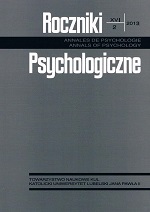Ideas regulatory mechanisms: Ideal self complexity and social attitudes
Ideas regulatory mechanisms: Ideal self complexity and social attitudes
Author(s): Maria JarymowiczSubject(s): Psychology
Published by: Towarzystwo Naukowe KUL & Katolicki Uniwersytet Lubelski Jana Pawła II
Keywords: desired self: ought self vs. ideal self; axiological complexity and axiological emotionality; asymmetry in Self–Outgroup distance rating; egalitarian and pro-life attitudes
Summary/Abstract: When do ideals influence functioning? The author assumes that the high complexity of the ideal self favors social attitudes consistent with axiological standards. Two correlative studies are presented: Study 1, with the participation of students from the University of Warsaw (N = 118), and Study 2, with the participation of young Internet users (N = 326). The hypothesis predicted that the number of ideal self attributes would correlate with egalitarian and pro-life attitudes. In both studies, participants were supposed to generate traits of the ideal self-reflecting its complexity (ISC). In Study 1, the asymmetry effect in the ratings of physical dictance between Self and Outgroup members was measured. In Study 2, a questionnaire was applied to measure attitudes towards egalitarian and pro-life rules. The results of both studies show that groups with lower ISC levels displayed a more stereotypical perception of distance between Self and Outgroup members as well as less egalitarian and less pro-life attitudes compared to groups with higher ISC levels.
Journal: Roczniki Psychologiczne
- Issue Year: 16/2013
- Issue No: 2
- Page Range: 181-197
- Page Count: 17
- Language: English

